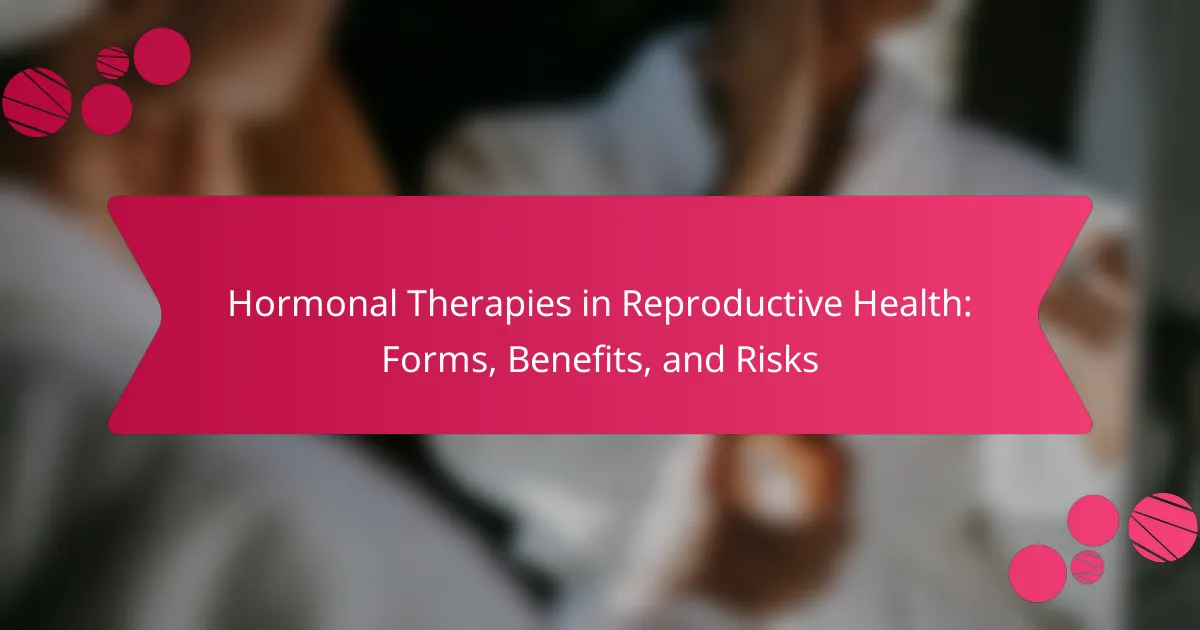Hormonal therapies in reproductive health offer significant benefits, including menstrual cycle regulation and menopausal symptom relief. This article explores various forms such as oral contraceptives and hormone replacement therapy, their advantages, and associated risks. Cultural perceptions and unique considerations for specific populations will also be discussed, highlighting the importance of personalized care. Emerging trends in hormonal treatments are shaping the future of reproductive health management.
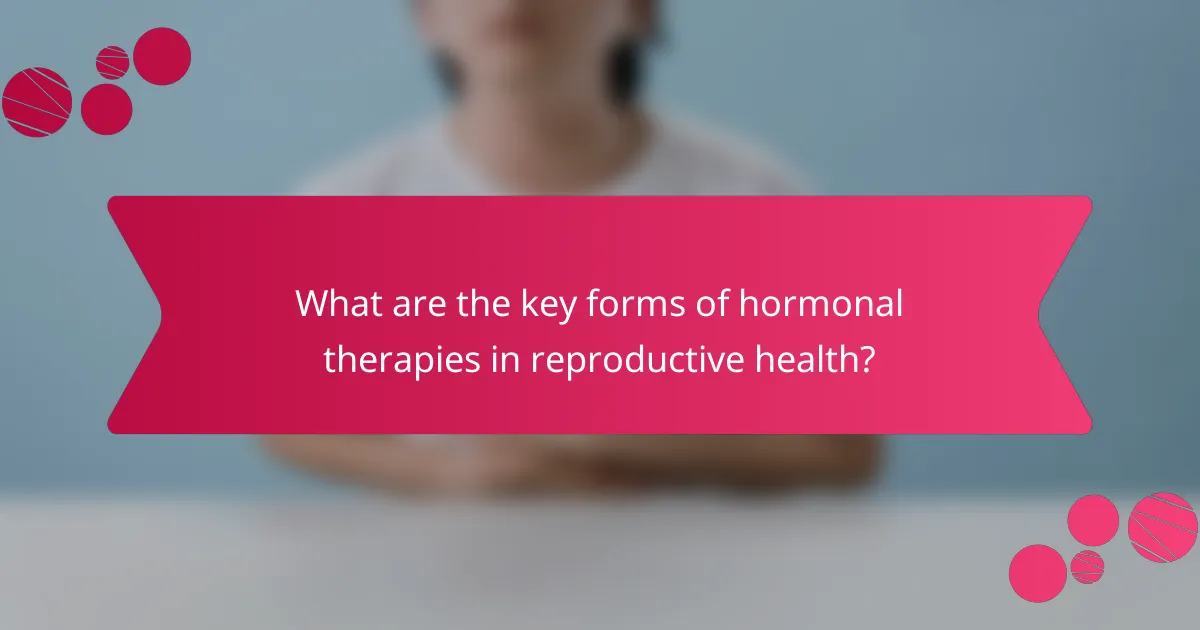
What are the key forms of hormonal therapies in reproductive health?
Hormonal therapies in reproductive health primarily include oral contraceptives, hormone replacement therapy, and injectable contraceptives. These forms help manage various reproductive health issues.
Oral contraceptives are widely used for birth control and regulating menstrual cycles. They contain synthetic hormones that prevent ovulation.
Hormone replacement therapy is commonly prescribed for menopausal symptoms. It alleviates symptoms like hot flashes and mood swings by replenishing estrogen levels.
Injectable contraceptives provide long-term birth control. They offer a convenient option with effectiveness lasting up to three months.
Each form has distinct benefits and potential risks, making it essential for individuals to consult healthcare providers for personalized recommendations.
How do hormonal contraceptives function in reproductive health?
Hormonal contraceptives primarily function by regulating hormonal levels to prevent ovulation. They alter the menstrual cycle, thicken cervical mucus, and thin the uterine lining. These mechanisms contribute to effective pregnancy prevention and can also provide benefits like reduced menstrual pain and regulation of cycles. However, risks include potential side effects such as mood changes and increased risk of certain health conditions. Understanding these factors is crucial for informed reproductive health decisions.
What role do hormone replacement therapies play in menopause management?
Hormone replacement therapies play a crucial role in managing menopause by alleviating symptoms and improving quality of life. These therapies can include estrogen, progesterone, or a combination, addressing issues like hot flashes, mood swings, and vaginal dryness. Benefits of hormone replacement include reduced risk of osteoporosis and enhanced emotional well-being. However, risks such as increased chances of certain cancers and cardiovascular issues must be considered. Balancing these factors is essential for effective menopause management.
Which hormonal treatments are used for polycystic ovary syndrome?
Hormonal treatments for polycystic ovary syndrome include oral contraceptives, progestins, and anti-androgens. These therapies help regulate menstrual cycles, reduce androgen levels, and manage symptoms.
1. **Oral Contraceptives**: Regulate menstrual cycles and reduce acne or hirsutism.
2. **Progestins**: Induce menstruation and protect against endometrial hyperplasia.
3. **Anti-androgens**: Lower testosterone levels, alleviating symptoms like excessive hair growth.
4. **Metformin**: Although not a hormone, it improves insulin sensitivity, often used alongside hormonal treatments.
Each treatment has benefits and risks, and a healthcare provider can determine the best approach based on individual needs.
How are hormonal therapies administered in clinical settings?
Hormonal therapies in clinical settings are typically administered through injections, pills, patches, or implants. Each method has specific benefits and risks associated with its use. Injections provide rapid hormone delivery, while pills offer convenience but may have variable absorption. Patches ensure steady hormone levels but require skin adherence. Implants allow for long-term hormone release with minimal maintenance. The choice of administration depends on patient needs, treatment goals, and potential side effects.
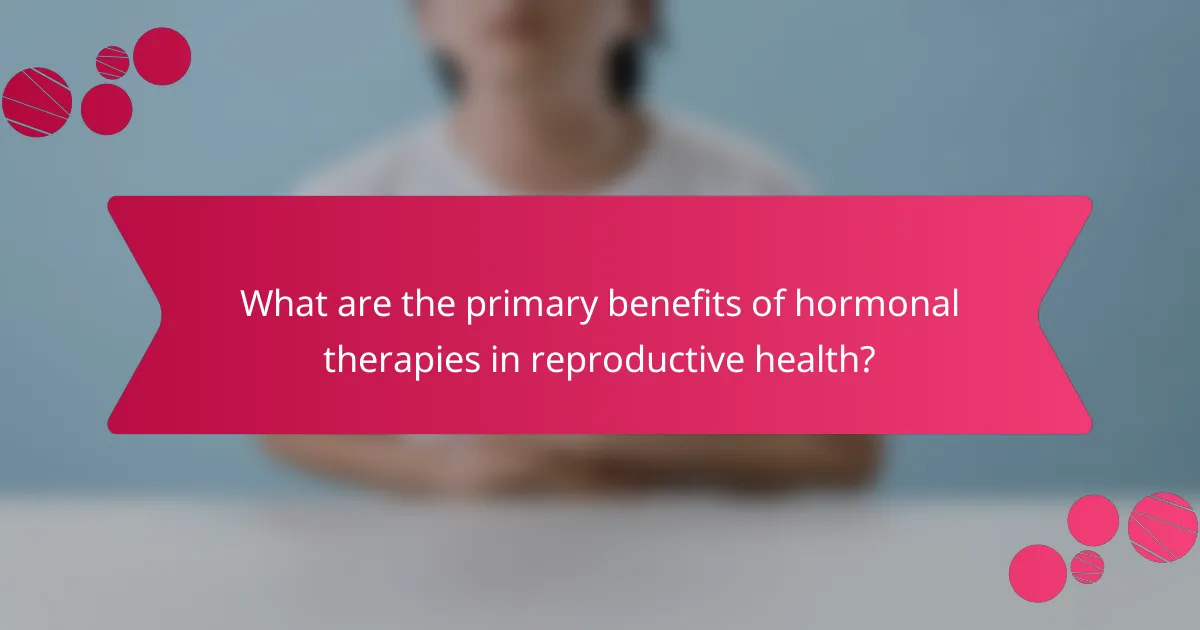
What are the primary benefits of hormonal therapies in reproductive health?
Hormonal therapies in reproductive health offer significant benefits, including regulation of menstrual cycles, alleviation of symptoms from menopause, and improved fertility outcomes. These therapies can balance hormone levels, reducing conditions like polycystic ovary syndrome and endometriosis. Additionally, they may enhance bone density and lower the risk of certain cancers. As a result, hormonal therapies play a crucial role in managing reproductive health effectively.
How do hormonal therapies improve menstrual regulation?
Hormonal therapies effectively improve menstrual regulation by balancing hormone levels. These therapies can reduce irregular cycles, alleviate heavy bleeding, and manage symptoms associated with menstrual disorders. For example, combined oral contraceptives stabilize estrogen and progesterone, leading to more predictable periods. Additionally, hormonal treatments can address underlying conditions like polycystic ovary syndrome (PCOS), enhancing overall reproductive health.
What mental health benefits are associated with hormonal therapies?
Hormonal therapies can improve mental health by alleviating symptoms of anxiety and depression. These treatments stabilize mood swings, enhance emotional well-being, and support cognitive function. For instance, hormone replacement therapy can reduce mood-related symptoms in individuals experiencing hormonal fluctuations. Additionally, studies suggest that hormonal therapies may lead to improved quality of life and decreased stress levels, particularly in those with reproductive health issues.
How do hormonal treatments enhance fertility outcomes?
Hormonal treatments significantly enhance fertility outcomes by regulating hormonal imbalances and optimizing reproductive functions. These therapies, including ovulation induction and hormone replacement, improve egg quality and increase the chances of conception. For instance, clomiphene citrate is effective for stimulating ovulation in women with irregular cycles. Additionally, hormonal therapies can address conditions like polycystic ovary syndrome, which negatively impacts fertility. However, potential risks include ovarian hyperstimulation syndrome and multiple pregnancies, necessitating careful monitoring.

What risks and side effects are associated with hormonal therapies?
Hormonal therapies can lead to various risks and side effects, including blood clots, weight gain, mood changes, and increased cancer risk. These effects vary based on the type of therapy and individual health factors. For example, estrogen therapy can elevate the risk of breast cancer, while progestin may cause mood swings. Monitoring and consulting healthcare providers are essential for managing these risks effectively.
Which common side effects should patients be aware of?
Patients should be aware that common side effects of hormonal therapies in reproductive health include mood changes, weight gain, and nausea. These effects can vary based on the specific therapy used and individual responses. Other potential side effects may include headaches, breast tenderness, and changes in menstrual cycles. Monitoring and consulting with healthcare providers can help manage these side effects effectively.
What serious health risks may arise from prolonged hormonal therapy use?
Prolonged hormonal therapy use may lead to serious health risks such as cardiovascular disease, blood clots, and certain cancers. These risks vary based on individual health profiles and the type of therapy used. For instance, estrogen therapy can increase the risk of breast cancer, while combined hormone therapy may elevate the risk of heart disease. Regular monitoring and consultations with healthcare providers are essential for managing these risks effectively.
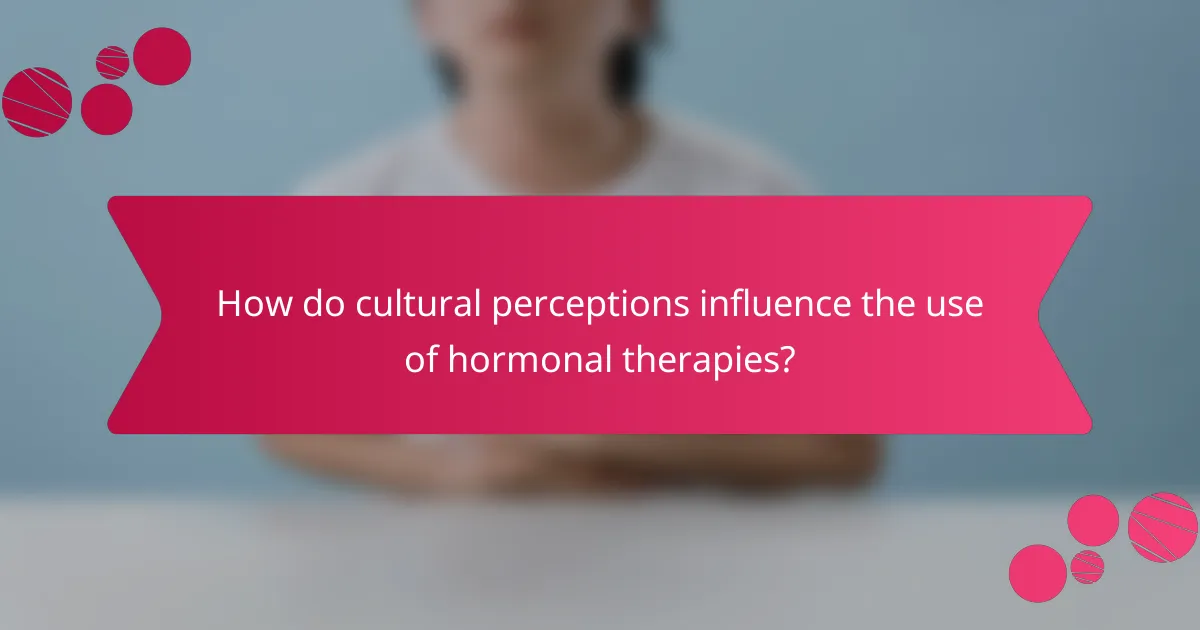
How do cultural perceptions influence the use of hormonal therapies?
Cultural perceptions significantly shape the acceptance and use of hormonal therapies. These therapies, often viewed through the lens of societal norms, can either be embraced or stigmatized based on cultural beliefs about reproductive health.
In some cultures, hormonal therapies are seen as essential for managing reproductive health, leading to widespread acceptance. In contrast, other cultures may view these therapies skeptically, associating them with unnatural or undesirable changes in the body.
Moreover, the perceived benefits of hormonal therapies, such as symptom relief and improved quality of life, can be overshadowed by fears regarding potential risks, including side effects and long-term health implications. This creates a complex landscape where cultural narratives influence individual choices and healthcare practices.
As a result, healthcare providers must navigate these cultural perceptions to offer personalized care that respects individual values while promoting informed decision-making regarding hormonal therapies.
What are the barriers to accessing hormonal therapies in different regions?
Barriers to accessing hormonal therapies vary by region and include regulatory restrictions, cultural beliefs, and economic factors. In some areas, limited healthcare infrastructure restricts availability. Additionally, stigma surrounding reproductive health can hinder acceptance and use. Access to education about these therapies is often inadequate, further complicating the situation.
How do social attitudes shape the acceptance of hormonal treatments?
Social attitudes significantly influence the acceptance of hormonal treatments in reproductive health. Cultural beliefs and societal norms shape perceptions about gender identity and health, affecting how individuals view these therapies. Acceptance varies widely across communities, often linked to education and awareness. For instance, increased understanding of hormonal therapies leads to greater acceptance, while misinformation can foster stigma. Social support networks also play a crucial role in shaping attitudes, as acceptance from family and peers can encourage individuals to pursue treatment.
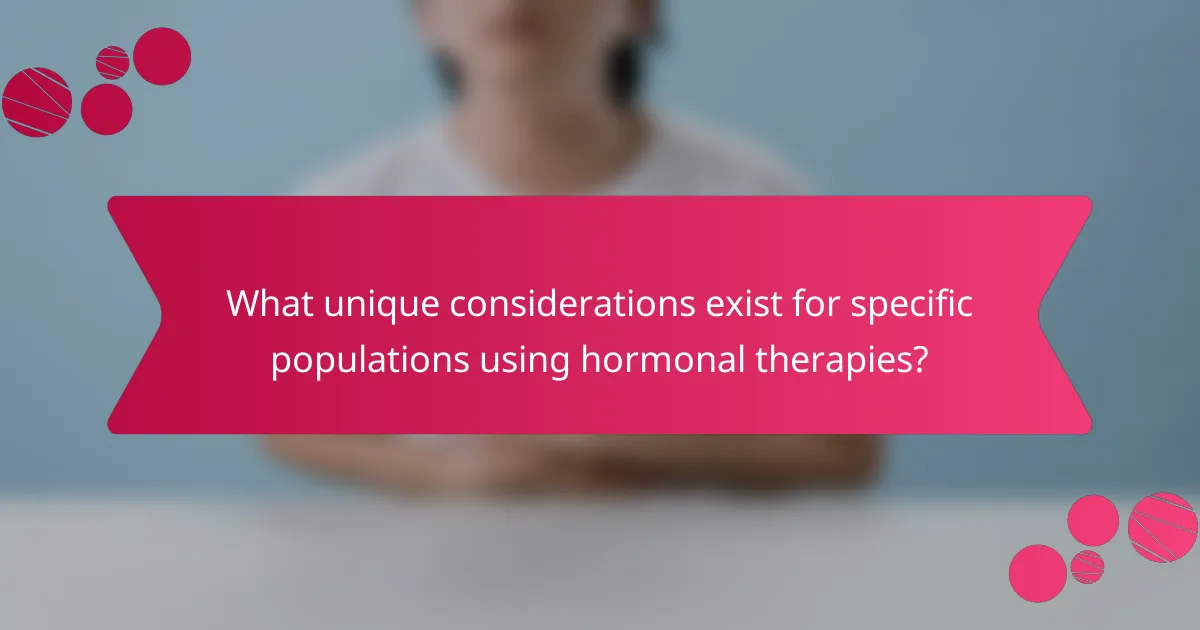
What unique considerations exist for specific populations using hormonal therapies?
Specific populations using hormonal therapies must consider unique factors such as age, gender identity, and underlying health conditions. For example, women undergoing menopause may require different dosages compared to younger individuals with hormonal imbalances. Transgender individuals may face distinct risks and benefits associated with hormone replacement therapy, necessitating tailored approaches. Additionally, individuals with pre-existing conditions like cardiovascular disease must be monitored closely due to potential complications. Understanding these unique considerations ensures safer and more effective treatment outcomes.
How do hormonal therapies differ for transgender individuals?
Hormonal therapies for transgender individuals primarily differ in their goals, types, and administration methods. These therapies aim to align an individual’s physical characteristics with their gender identity.
Transgender women typically use estrogen and anti-androgens to promote feminine traits, such as breast development and fat redistribution. Transgender men often utilize testosterone to induce masculine features like increased body hair and voice deepening. The duration and dosage of these therapies can vary significantly based on individual health profiles and desired outcomes.
Risks associated with hormonal therapies include cardiovascular issues, liver problems, and mood changes, which necessitate regular medical supervision. Understanding these differences is crucial for informed decision-making and effective health management in transgender care.
What specific factors affect hormonal therapy choices in older adults?
Several factors influence hormonal therapy choices in older adults, including health status, personal preferences, and risk factors. Age-related changes can affect metabolism and hormone levels, necessitating tailored approaches. Comorbidities like cardiovascular disease or cancer history may limit options. Additionally, the potential benefits and risks of therapies must align with individual health goals. Lastly, patient education and support systems play a crucial role in decision-making, ensuring informed choices that consider both physical and emotional well-being.

What emerging trends are shaping the future of hormonal therapies?
Emerging trends are significantly influencing hormonal therapies in reproductive health. Personalized medicine is gaining traction, allowing treatments to be tailored to individual hormonal profiles. Advances in biotechnology are enhancing drug delivery systems, improving efficacy and reducing side effects. Additionally, integrative approaches combining traditional and modern therapies are becoming popular, addressing holistic patient needs. Increased focus on patient education and empowerment is also shaping the landscape, encouraging informed decision-making regarding hormonal treatment options.
How is technology influencing the development of new hormonal treatments?
Technology is significantly enhancing the development of new hormonal treatments by enabling precision medicine and improved delivery systems. Advanced data analytics and artificial intelligence facilitate the identification of individual hormonal profiles, leading to tailored therapies. Innovative drug delivery methods, such as transdermal patches and implantable devices, enhance efficacy and patient compliance. Moreover, biotechnology is paving the way for novel hormonal compounds that target specific receptors, minimizing side effects. As a result, patients benefit from more effective and personalized treatment options in reproductive health.
What innovations are being explored in personalized hormonal therapy?
Innovations in personalized hormonal therapy focus on tailoring treatments to individual hormonal profiles. Advancements include genetic testing to determine optimal hormone types and dosages. Additionally, wearable technology is being explored to monitor hormonal fluctuations in real-time, enhancing treatment precision. Integration of artificial intelligence aids in predicting patient responses, allowing for more effective and customized therapies. These innovations aim to minimize risks and maximize benefits for reproductive health.
What are the best practices for monitoring patients on hormonal therapies?
Regular monitoring of patients on hormonal therapies is essential for ensuring safety and efficacy. Best practices include frequent assessment of hormone levels, evaluating side effects, and adjusting dosages as needed.
1. Schedule regular blood tests to monitor hormone levels and assess therapeutic response.
2. Conduct routine evaluations of side effects, including mood changes, weight fluctuations, and metabolic impacts.
3. Educate patients on signs of complications, such as thromboembolic events or cardiovascular issues.
4. Maintain open communication to address patient concerns and adherence to therapy.
5. Utilize a multidisciplinary approach, involving endocrinologists, gynecologists, and primary care providers for comprehensive care.
6. Document all findings and adjustments in the patient’s medical record for continuity of care.
